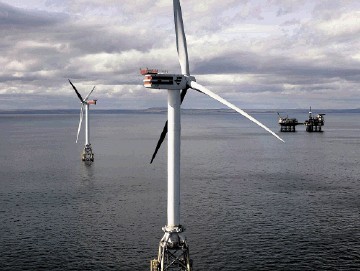
Dundee University is to lead a major research project to determine whether cheaper, more environmentally responsible and more effective foundations can be developed for the offshore renewables industry.
The project, funded by a £1million grant from the Engineering and Physical Sciences Research Council, will look at the use of screw piles for offshore installations, rather than the currently favoured and noisy driven-pile solutions.
These are foundations which are screwed into the ground and are widely used, especially onshore, with modest application by the offshore oil & gas industry.
Leading the charge is Dr Mike Brown, senior lecturer in civil engineering.
He says the UK has challenging targets for expansion of energy from renewables with the potential for over 5,000 offshore wind turbines by 2020.
The biggest projects are the so-called Round Three developments which, in some cases, would fit into the top-ten power stations global league table. And most will be in relatively deepwater.
“The necessary move to deeper water will increase cost and put greater demands on subsea structures and foundations,” says Brown.
“There is already cost pressure on the offshore sector as people wait to see if it can be made more affordable, so we really need to find better solutions for how we develop capacity.
“Screw piles are potentially very attractive as a lower cost and more environmentally friendly option. However, there are significant challenges to be addressed.
“If we are to develop them for offshore use they will likely be larger than those used onshore, and face different pressures, so our work will look at whether they can meet the performance and efficiency issues.”
Currently, the main foundation solutions being considered for offshore wind installations are driven piles, large mono-piles, steel jacket or concrete gravity-based structures (GBS).
Brown notes that the driving of piles in large numbers offshore causes concerns over plant availability and impact on marine mammals.
“There are also concerns over the limit of practical monopile development and the high material demands of GBS. Screw piles have the potential to overcome these issues and are scalable for future development from current onshore systems which have relatively low noise installation and are efficient in terms of both tensile and compressive capacity,” says the project leader.
“The research has the potential to make it easier to deploy screw pile foundations for offshore renewables.
“This project will develop foundations able to deal with current water depths and will provide understanding of the behaviour of piles as water depths and the demands on the foundations increase.
“By harnessing the installation and performance benefits of screw pile/anchor technology, the results of the project will hopefully contribute to an overall cost reduction in electricity generated by renewable means and increase the public’s confidence in the future viability of this energy source.”
The project is being led by Dundee and includes contributions with the Universities of Durham and Southampton and also private sector partners Cathie Associates, Screwfast Foundations Ltd, SeaRoc Group and Soil Machine Dynamics UK.
Dundee was ranked in the top three in the UK for civil and construction engineering in the 2014 Research Excellence Framework, the major survey of research quality at higher education institutions.
Indeed, this university has considerable expertise in concrete and geotechnical engineering.
As part of the new research project it joins the EPSRC’s Supergen Wind research hub, which is funded by the RCUK Energy Programme.
Recommended for you
